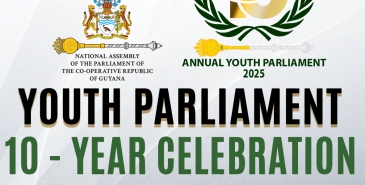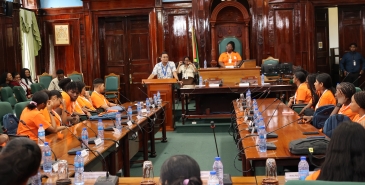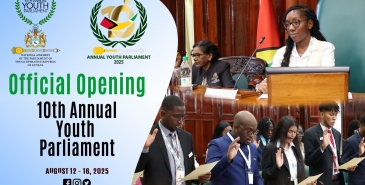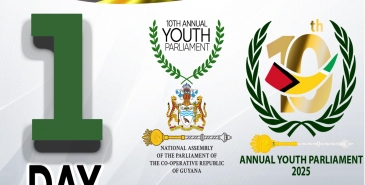Appointment Of A Commission Of Inquiry To Investigate The Incidence Of Trafficking In Persons In Guyana
Speech delivered at: 57thSitting - Tenth Parliament - 22 May, 2013
22 May, 2013
4171
Ms. Shadick: Thank you, Mdm. Deputy Speaker. The exploitation of man by man started possibly since just after creation. It is heinous, reprehensible and abhorred by all. What we need to understand is that not all exploitation is trafficking in persons.
In 2004, in June, when the Department of States in the United States of America issued its Report on Trafficking in Persons and listed Guyana as a tier three country, Guyana had to quickly wake up and find out what trafficking in persons really was. We knew our laws long before that. The Summary Jurisdiction (Offences) Act, Sections 72, 73 and 74, talks about exploitation. Anyone who procures or attempts to procure any female to have any unlawful carnal connection, either within or without Guyana with any other person, or procures or attempts to procure persons to become an inmate of a brothel or elsewhere or procures or attempts to procure any female to leave her usual place of abode in Guyana with intent that she may for the purposes of prostitution become an inmate of a brothel either within or without Guyana shall be guilty of a misdemeanour and be liable to imprisonment for two years. This is Chapter 8:01. This law was amended and so on.
Our Criminal Law Offences Act catered for recognition of people who procured people for illicit purposes. This Act has not been repealed; it is still extant and people can be charged under it. This is the Act that caters for what we usually call the age of consent. This old one had provided for if someone had sex with a minor under the age of 12 years, he/she would be guilty of statutory rape regardless of whether his or her defence was that the person consented. We went all over this country. We changed that law. We raised that age of consent, as we call it, to 16 years.
When in 2004, June, we were confronted with the Report on Trafficking in Persons, we quickly had to differentiate between what was trafficking, what was prostitution, what was labour exploitation and the different kinds of exploitation. As I listened to my Hon. Colleague and Friend, Mrs. Volda Lawrence, she spoke about women and children. That is true. Lots of women and children are being exploited; not all of them, however, are being trafficked. When we talk about - and I wrote down the phrase - ‘exploit human commodity’, my mind went to the advertisement for fancy motor cars with girls dressed… That is an exploitation of human beings, making them a commodity. That, however, is not trafficking. It is abhorrent must be condemned, and we should all fight for things like that to stop. We recognise, when we asked: how did a country… The Report states that a country is listed if there are 100 documented cases of trafficking in that country. We asked to be given three. The US was under no obligation to tell us what three of the 100 were, much less 100.
As a Government and as a country, we were not in denial. There was exploitation of man by man going on. What we had to do was to try to differentiate and deal with those that fell under the definition of trafficking. The Hon. Minister, Jennifer Webster, read from the Act what the definition of trafficking is. The definition has separate… You, Mdm. Deputy Speaker, was on the Task Force. We sat and went through this law and looked at word after word to see how we could make it better. It has different things. It has to be recruitment – and this is important – it has to be transportation or transferred movement, and it has to be harbouring, keeping somewhere, by means of threat or by means of force, abduction, coercion, fraud or deception. These are things, as legal people, my Friend, Hon. Basil Williams will know, the parts of the definition, that have to be met for it to become trafficking.
Guyana did not go into a mode of defensiveness and sit down and so on. It speaks to how seriously we took this, that from June 2004 to September when the midyear report came out we had moved from a tier three to a tier two watch list and then we passed our law. Do you know what? This country developed protocols. We had training. Teams of people led by yours truly went to almost every Hinterland community. We went to Mahdia. We went to the mining area in Frenchman, near Port Kaituma. We went to all of these places. We spoke to people. Our teams included police, mines officers, Amerindian welfare officers, and welfare officers. We had teams of people who went into all of these areas. There were labour officers, people from the National Insurance Scheme (NIS). We put together teams. We went to all of these communities. We trained people. We educated people. And, yes, a plan of action was developed. [Mr. B. Williams: And we went back to tier three.] The plan of action may have to be upgraded. I hear my Friend, Mr. Williams, saying that Guyana went back to being a tier three country.
The United States of America said that all of this had been done but Guyana is not getting any convictions. What did we do? We sent police officers – eight – together with the representatives from the Trafficking in Persons unit, to be trained in prosecuting trafficking in persons offences. We were successful. There were two convictions. [Mr. B. Williams: [Inaudible]] Do you know why, Mdm. Deputy Speaker? It is because lawyers like my Hon. Friend, Mr. Basil Williams, have not taken the time to read this Act. They have to know what is inside. We do not have attorneys-at-law with social consciences who will agree to become victim advocates. [Interruption]
Mdm. Deputy Speaker, I ask that I be allowed to speak so that this House can be enlightened. We need victim advocates. The last thing Guyana needs right now is another commission of inquiry. There was one which cost this country $200 million and the people who asked for it do not like what came out of the Inquiry. The last thing we need is a commission. We are not in denial that there are incidences of exploitation, some of which may be trafficking. We are not in denial about that; none of us is in denial. Nobody in the Government is in denial. But what we do not need is another commission of inquiry which is another layer of bureaucracy.
What we need is clearly adumbrated. When a plan of action is done, it should not only be for the Ministry of Labour, Human Services and Social Security, as the Hon. Leader of the Opposition said. Actually, if one reads this Act, one would see that the lead Ministry is the Ministry of Home Affairs in collaboration with the Ministries of Labour, Human Services and Social Security, Foreign Affairs, Amerindian Affairs and Legal Affairs. The Ministers in those Ministries, according to the Act and according to practice, belong to a national Task Force which meets at the Ministry of Home Affairs every month. I sat on that Task Force up to 2011. I know that the Task Force meets. [Mr. B. Williams: [Inaudible]] Mdm. Deputy Speaker, when people keep denigrating the efforts of what is happening, when they decide that they are Members of the Opposition and only the people in Government have to deal with a problem, when they speak and do not act, this is where the real problem is. This is the real tragedy. The tragedy of this country is that everybody is looking for whose problem it is. I am saying here that it is a Guyanese problem. It is the problem of the Members sitting over there; it is the problem of the Members sitting over here; it is the problem of all those leaders in all of the communities; it is the problem of the pastors and preachers in the church. Every single hinterland community has a vibrant church. When we went to certain communities to do consultations, we could not go on certain days because those were church days or we could not have a meeting before a particular time because there were church services. That is good. We appreciate that. But this fight has to be a fight by all of us. All of us have to become educated in what trafficking in persons really is. What we are talking about in this Assembly, and which has to be talked about, is exploitation, labour exploitation.
There was a nurse who sat in a health centre in Paramakatoi and was married to a man whose brother owned a ranch somewhere in Abary. That nurse was recruiting her fellow villagers, males, it is not females alone who are trafficked, and telling them to go for these jobs. She told them that they would do well, get paid and their families would get money and so on. Men went for the jobs and women waited. No money was forthcoming. There was not even a radio call. Nothing happened. When we investigated, those men were being held there because they had to pay back all of the money that was spent to take them there; they had to pay a certain amount of money for the food stuff they ate every week. That is trafficking. That does not involve prostitution, but that is trafficking. They were deceived by a member of their community, they were transported, and they were being held against their will and exploited. That falls under trafficking. We have to be careful. We all abhor exploitation. We all should, if we do not.
I went to several meetings at which representatives of the US State Department…this was a recent thing. It was in 2004. Every country was being put on a list. The Organization of American States (OAS) had a body of women...This discussion was always coming up at every meeting – trafficking in persons, who was what tier and on what list and so on. I remember asking: when a recruiter comes from the United States of America, puts an advertisement in the newspapers and invites our teachers and/or nurses to a meeting in the Savannah Suite of the Pegasus Hotel to tell them about job opportunities in the United States of America and tell them that after a number of years their families can join them, and they will give them visas and so on... They take them to the United States of America. What they are promised they never get. They get the jobs but then they soon find out that they do not have the same benefits as the Americans. Their benefits are less. Then they find out, after two years, that the visa expired and they have to apply for another one which had something called a residency requirement. They had to have been residents in their home country for two years before they could have been applicable. There were requests coming to our Ministry of Foreign Affairs for this residency requirement to be waived because what they were promised was not being given to them. They were getting less money. I argued at those meetings. I asked: what do you do? Are those people not trafficked? Is that not a form of trafficking? Do you know what I found out? Yes, and they are eligible for a T Visa. At least one Guyanese teacher who I know managed to get a T visa. [An. Hon. Member: What is a T visa?] It is a trafficking visa; it is a T visa that the United States had. Not a lot of the attorneys know about it because it is a well kept secret in the United States of America. There is a T visa.
Our own Combating of Trafficking in Persons Act has a section which talks about the immigration status of victims of trafficking. As if in reciprocity to that T visa, section 19 states:
“The Minister of Home Affairs may provide victims of trafficking and accompanying dependent children with appropriate visas and other required authorisation to permit them to remain in Guyana for the duration of the criminal prosecution...”
Section two states that victims of trafficking may be eligible for residence in Guyana in the manner prescribed in the Immigration Act, provided that they complied...with reasonable grounds.
Section 3 states that the victims’ spouse and children and in the case of child victims, their parents or guardians, can be eligible for that. We have that in our Act. The United States’ Act has that but it is a well kept secret.
Not all people who are trafficked are trafficked for the purpose of prostitution and not all of the people who go into mining areas are trafficked. Some of them go and they have regular jobs. We spoke to these people. We went in and spoke to people. They answered advertisements. They went and sold in shops and so on but they saw that the pay they were getting was less than the pay of persons who were providing sexual services. Then, when the man promised to give them two penny weights of gold and did not give them, then they cried out and tried to leave. I am saying it again: all forms of exploitation are bad. All forms have to be condemned. And all forms of exploitation must be wiped out. [An Hon. Member: And we are working on that.] We are working on that. There are protocols that exist.
When we had to provide housing for trafficking victims, the Government gave, as a subvention to the Help & Shelter Organisation…By the way, the shelter which the Help & Shelter occupies was a shelter which was built through the auspices of the Government of Guyana on land which was given to them by the Government. They used to use donations to run it. When we wanted to use it as a shelter for trafficking victims, we stood the entire annual cost of running that shelter. When I found out from the United States’ representatives about the number of shelters it had, it had one. This was for the entire United States. This was in 2005 or 2006. Again, I am saying that we are a small country. We are a country of less than three quarters of a million people. We cannot and we should not be accused of abandoning our people and making our victims into criminals.
If a child, woman, young boy, or man is rescued from an area in the hinterland and cannot reach a proper housing area in the first night, what is wrong with that child, man, woman or boy being put to sleep on a mattress, sheet or bag on the floor – at least the individual would not be exploited then – pending transportation to a more suitable shelter?
Our problem has been and continues to be…and as long as I have breath and as long as I have a say anywhere, I will continue to advocate for this: trafficking in persons matters should be tried by a single magistrate, somebody who understand the concept. There was one such magistrate and that is why there were two convictions. Unfortunately, that magistrate has gone into private practice. It is not that there must be a trafficking in persons court. That is not what I am advocating. I am advocating that all of the matters be heard by one magistrate because that one magistrate will gain expertise in dealing with the matters.
We need to have lawyers who will develop a social conscience and volunteer to be victim advocates to advocate on behalf of victims. We need that. The law asks for victim advocates.
Why I am saying that there should be one designated court is because it will also allow for the expeditious trial of a matter so the victim does not have to be kept, for instance, in the Amerindian Hostel where some lady named Mary is going to go and say that she is a person’s aunt, the person is here too long and take the persons to some House in Sophia where people drugged her…all of this happened. There were people visiting her in an out.
The victims need to go back to their families. This is what we have to advocate for. If the matter happened in the Northwest District and they have court once every three months, that matter should not be tried there. That matter should be tried in an area that has court every day so that in a week or two the matter can be dispensed with and a decision can happen in the court. That is what we must advocate for. Those are things we must talk about. Why are we asking for another commission of inquiry? We would be spending money on people who will sit there…some of them may not even know what trafficking in persons is. And then we are going to get a result that nobody is going to be happy with.
I recognise and I have always recognised…and I speak about this so passionately because from 2004 I have been personally involved in this and our labour officers…we have trained 300 persons called Trafficking Focal Points. In every village, they communicated with people by radio. We had a system in which a lady on the Essequibo Coast could have called right away and say that somebody was being brought out of the Pomeroon and someone was there to pick her up. We had that system. The system may have broken down in some places. We need to fix those little gaps and so on. Tell us that.
I applaud the Women Miners Association for finding out where exploitation takes place but, again I say, not all exploitation is trafficking. Trafficking involves exploitation. We have to be careful. People must be charged but they must be charged under the right law or else the case will be lost. There are lawyers who are very bright in representing the perpetrators. We do not have lawyers who are very bright and willing to become victim advocates. We need people to volunteer to become victim advocates.
In the Northwest District, there was a mother who, for the sum of $20,000 a month, sent her 12-year-old child to sleep with a businessman, bathe, change her clothes, go to school, go home, go back and stay with the businessman. Those are real cases. Do you know what is most heinous? I do not know how true these are but when one reads the reports of law enforcement officers who are involved in the procurement of these victims…One of the convictions we had was against the wife of a law enforcement officer who was recruiting and taking in and the law enforcement officer was right there. He probably used to help but he was not charged. His wife had a shop.
We have the phenomenon of businessmen from the Corentyne driving to Charity on a Monday and from the young girls who come out to Charity, they chose the young ones they wanted to work in their shops because where they have the shops, the people around there do not want their children to work. They want the prettier girls so that they can entice people to come and spend their money. All of these things exist. The Ministries of Human Services and Social Security and Home Affairs and the Guyana Police Force are not unaware of these things. The Ministry of Labour is not unaware. Where there are gaps in the chain and in the protocol, our recommendation must be that those gaps be filled and that the system of rescue and shelter, and charge and prosecution be done in a more efficient and expeditious way. [Ms. Ally: Ms. Shadick, your time is up.] Thank you, Madam Chief Whip, but I think I have earned the right to stand here and speak for as long as I want.
My appeal to all Members of this House is that everybody must get involved. We all have to get involved and, again I say, not by a commission of inquiry. I am sorry. I will not vote for the establishment of a commission of inquiry. My vote for this motion will have to be no.
Thank you, Mdm. Deputy Speaker. [Applause]
Speech delivered by:
What's New

17 August, 2025
10th Annual Youth Parliament Closes: Celebrating a Decade of Impact, Excellence, and Youth Empowerment10th Annual Youth Parliament Closes: Celebrating a Decade of Impact, Excellence, and Youth Empower

13 August, 2025
Youth Parliamentarians Assemble for Grand Rehearsals for the 10th Annual Youth Parliament

12 August, 2025
10th Annual Youth Parliament Kicks Off – Young Voices, Bold Ideas, Bright Futures!

11 August, 2025
10th Annual Parliament Kicks off tomorrow

